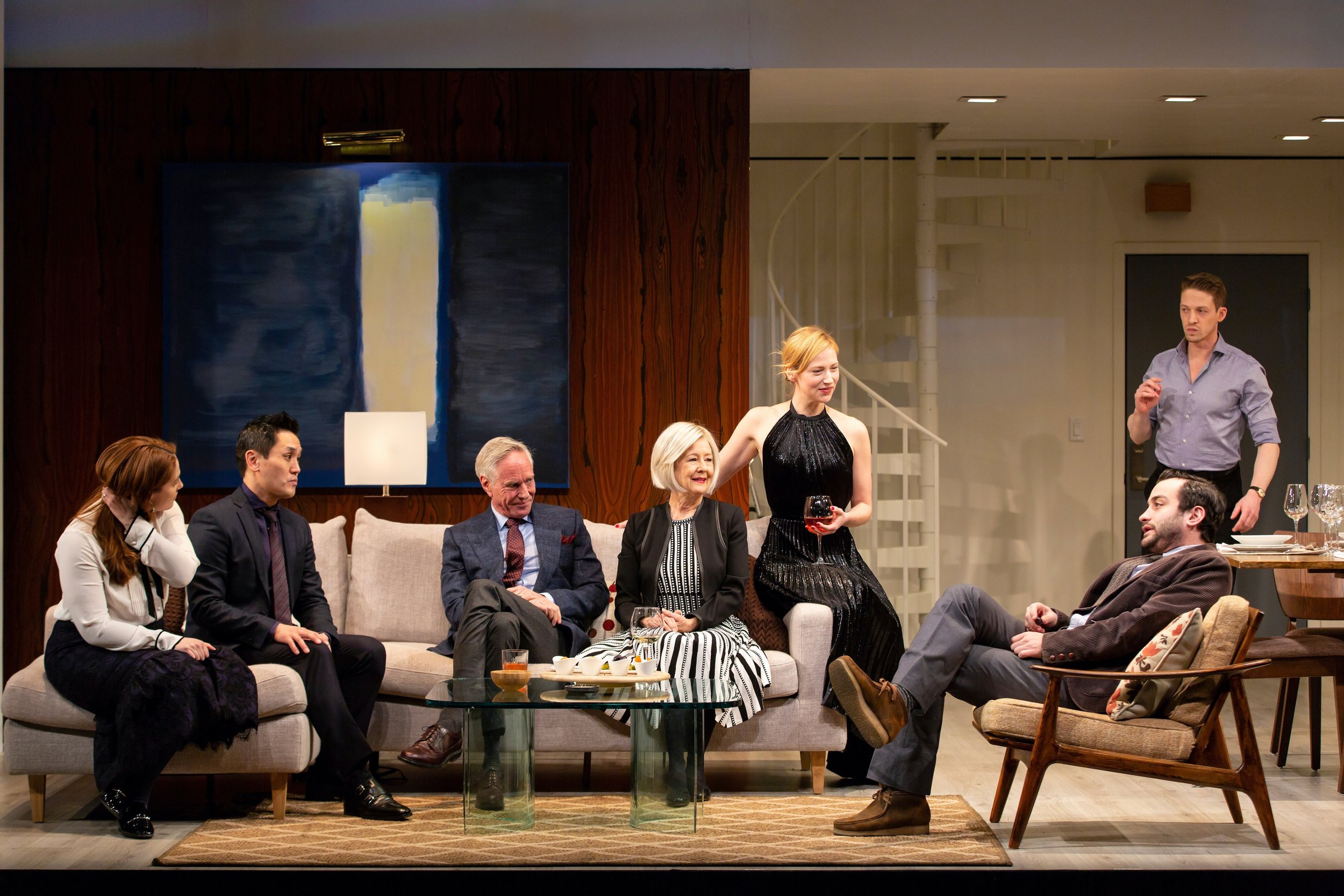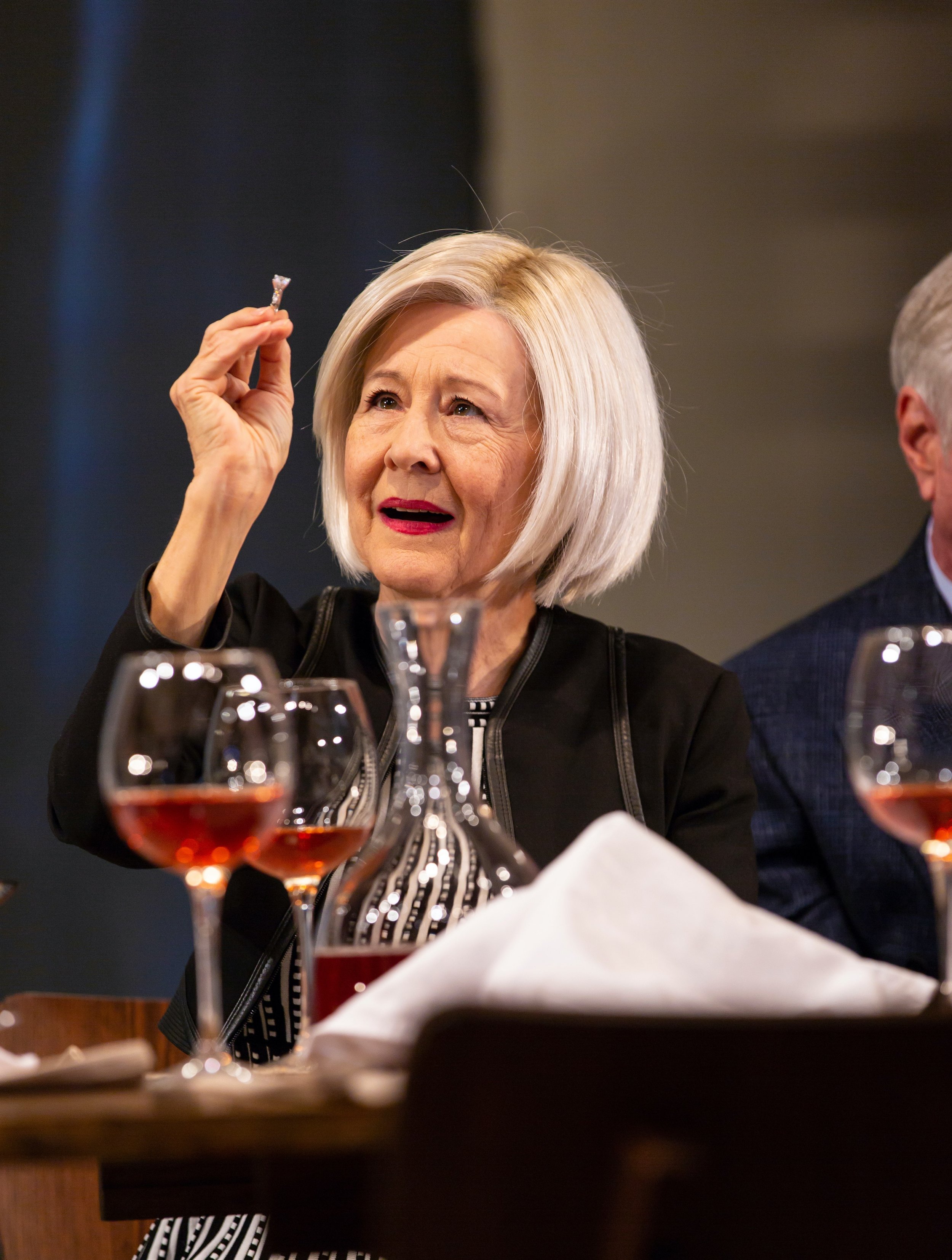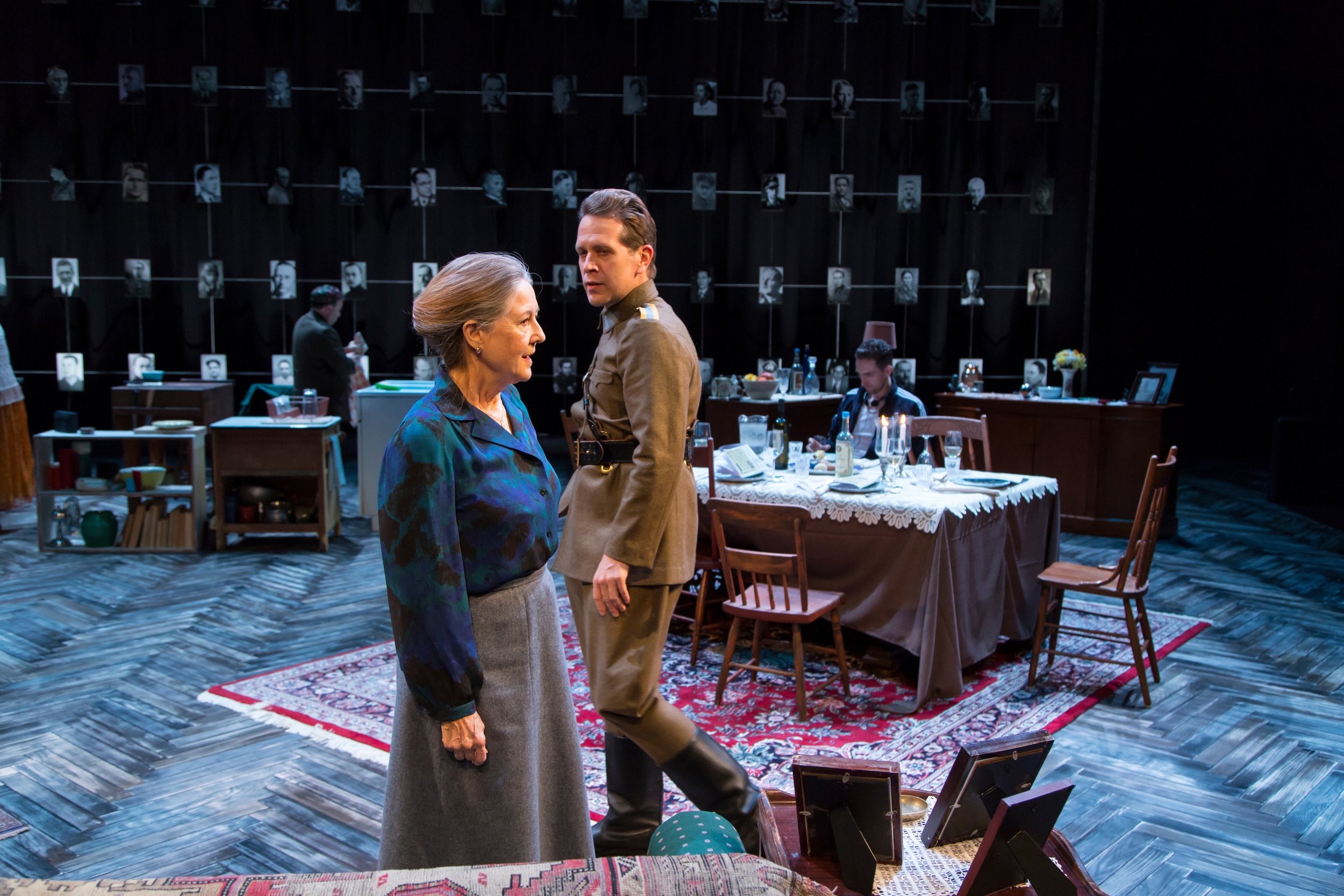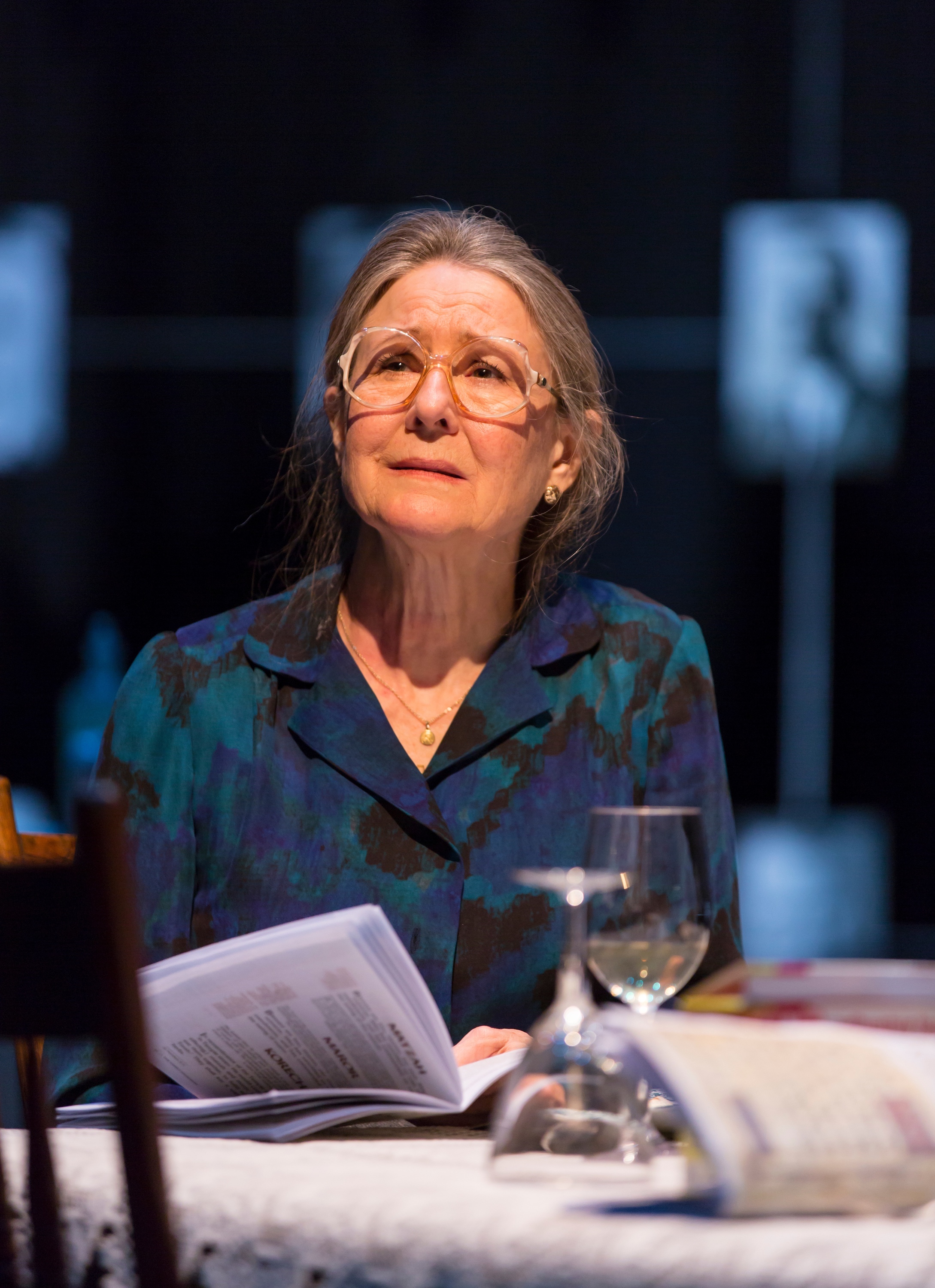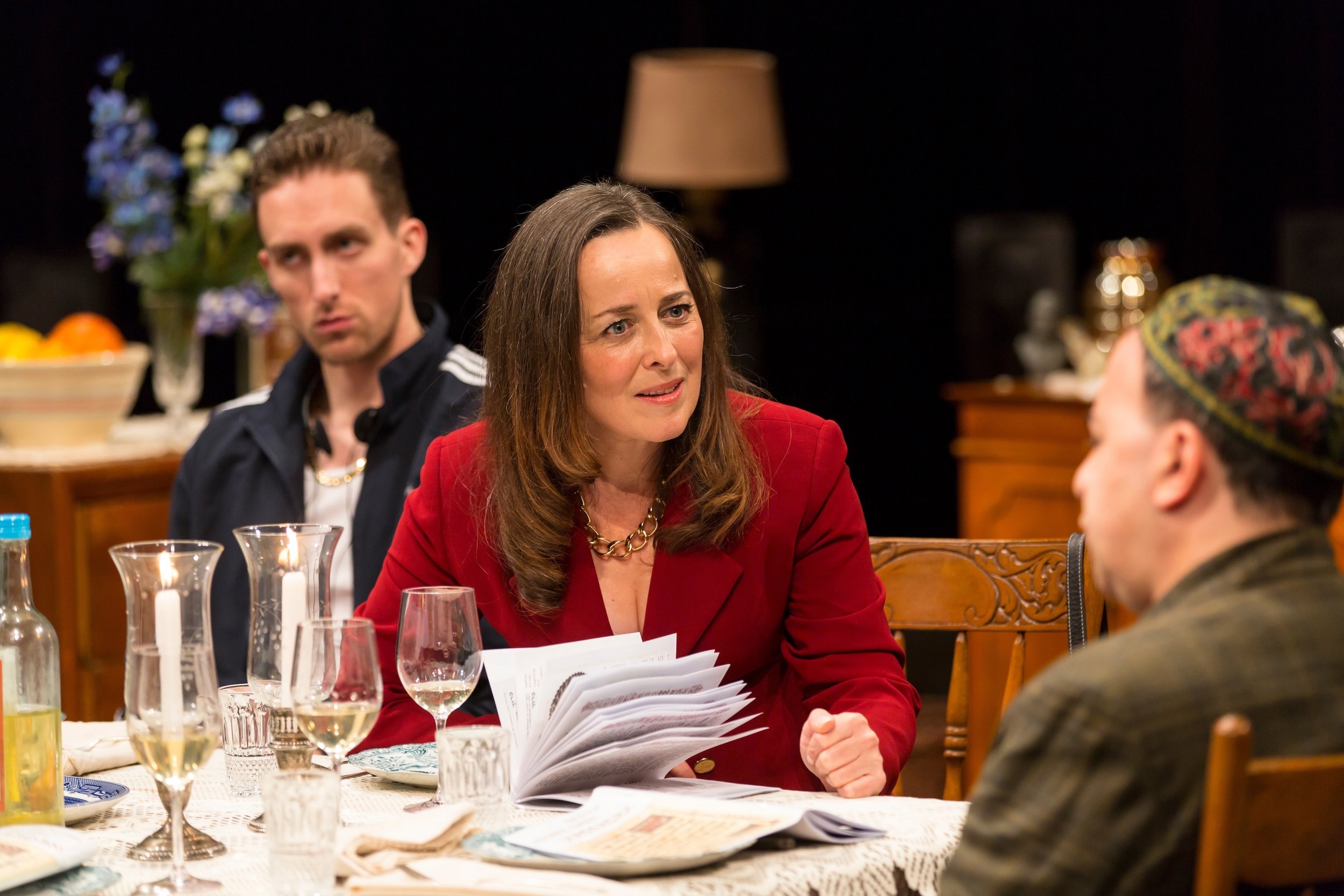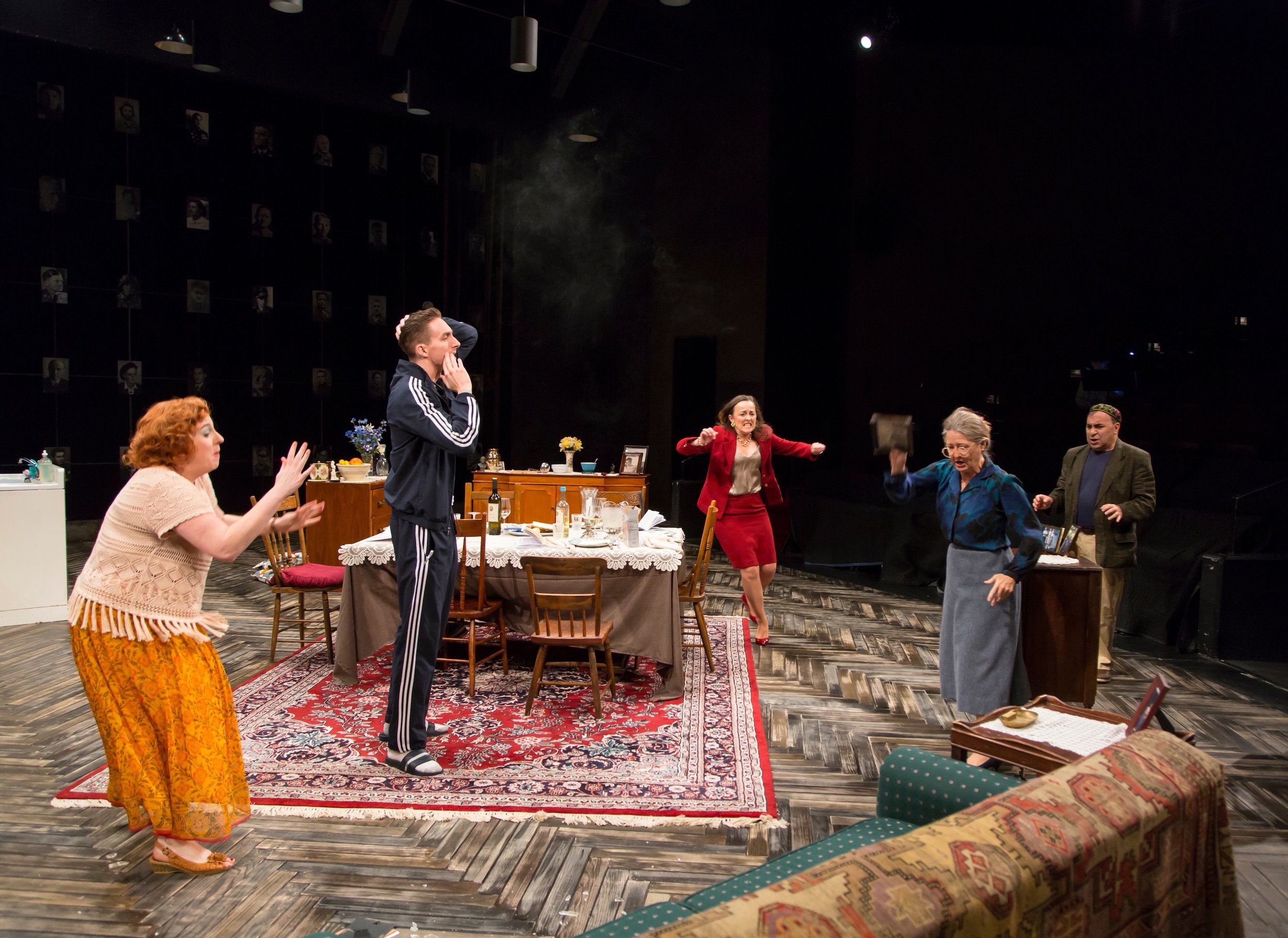Review of The Engagement Party, Hartford Stage
Dinner parties never seem to go well onstage. The assembled characters are bound to find some cause for friction that will defeat the best-intentioned bonhomie. Think only of two plays produced last season at Hartford Stage: Sarah Gancher’s Seder and Athol Fugard’s A Lesson from Aloes. Though Samuel Baum’s The Engagement Party, currently in its world premiere there, doesn’t quite launch us into the contested waters of those two predecessors, it does live up to the expectation that the thin veneer of social cheer will be cracked and warped and all but destroyed by evening’s end.
There is entertainment in watching that happen—if only because Baum’s characters are so insular in their attitudes—but the play’s insistence on a whodunit moment (or, more properly, a “was something done?”) creates a catalyst that leaves a bit to be desired. Maybe I’d just like to think better of everyone gathered here than they do of each other, or maybe it’s that Baum, and director Darko Tresjnak, want characters we can “suspect” rather than characters we can expect to be complicated.
Haley (Anne Troup), Kai (Brian Lee Huynh), Conrad (Richard Bekins), Gail (Mia Dillon), Katherine (Beth Riesgraf), Alan (Teddy Bergman), Josh (Zach Appelman) in the world premiere of The Engagement Party at Hartford Stage (photos by T. Charles Erickson)
Josh (Zach Appelman) and Catherine (Beth Riesgraf) are a well-to-do couple in a swanky Manhattan townhouse, its living and dining areas’ comfortable modernism perfectly established by Alexander Dodge’s enthralling set, which spins to reveal a showcase kitchen—with an incredibly high ceiling inferred—and, later, a second floor bedroom we see through a picture window. Each space is more enclosed than the last, and that makes for an escalating sense of claustrophobia as the partyers find themselves looking over each other’s shoulders and trying to catch hints of the conversation walked in upon.
The guests are: Catherine’s parents, Conrad (Richard Bekins), a fit septuagenarian, and his wife Gail (Mia Dillon), who disdains sporting a needed crutch; Haley (Anne Troup), much frumpier than her friend Catherine, and her husband Kai (Brian Lee Huynh), Josh’s not-as-successful colleague. The two younger couples have been mutual friends since college—Harvard—along with Alan (Teddy Bergman), the intellectual of the bunch who now teaches at Columbia and disdains the trappings of wealth that his former classmates are so keen on curating. But he’s not the real odd-man-out: that role is filled, with jocular, working-class machismo, by Johnny (Brian Patrick Murphy), a childhood friend of Josh’s who knew him when.
Johnny (Brian Patrick Murphy), Josh (Zach Appelman), Katherine (Beth Riesgraf), Conrad (Richard Bekins), Gail (Mia Dillon), Kai (Brian Lee Huynh), Alan (Teddy Bergman), Haley (Anne Troup)
The revelations that come out about what the characters are hiding or lying about deserve to be preserved from spoilers, but the reliance on a misplaced—and insanely costly—engagement ring as the evening’s turning point spoiled what had looked to be a play in which we get to see what friends of long-standing say about one another when one or another is out of the room. That play gets swept away, more or less, by an extended investigation of suspicion that traps the characters (for a time) as though in a “lite” version of The Exterminating Angel. When Alan—whom Teddy Bergman plays with captivating dryness—leaves the party, close behind tearful Haley and exasperated Kai, I was quite sorry to see him go and wished we could follow him to some other destination where he might continue to add interest to the evening.
Katherine (Beth Riesgraf), Kai (Brian Lee Huynh), Alan (Teddy Bergman), Josh (Zach Appelman)
Back inside, the drama unfolding between the sophisticated elder couple and their vapid daughter and up-from-Canarsie son-in-law-to-be escalates to near violence. Johnny—important if only because he knows the backstory that Josh has told no one—heads out for coffee, inviting Josh for a dialogue that never occurs. Pity, but the host can’t leave until the expensive engagement ring’s whereabouts are determined.
The revelation you might be expecting—Baum is the author of The Wizard of Lies, the gripping story of Bernie Madoff, and the play is set, deliberately we imagine, in 2007, just about when the lie that was our nation’s economy was exposed—doesn’t materialize. That’s too “Noughts”; the exposures of the “Teens” have been “Me-Too” moments, so think along those lines.
Katherine (Beth Riesgraf), Josh (Zach Appelman)
The women here are mostly engaged in low-key reaction—with the always excellent Mia Dillon almost entirely wasted—though Catherine eventually gets to vent at her parents and husband. She may be the one we sympathize with most, but since she has cluelessly not divined much about the men in her life, we can only go so far with that. As Josh, Zach Appelman has to go from grabby husband to alienated son-in-law to awkward boss-friend-host (of Kai) to embarrassed chum (of Johnny), and eventually to hyper, almost paranoid, frenemy to everyone and, at last, hero egregiously wronged while also still wronging. We might think better of him were it not that he seems to understand himself so little.
Conrad (Richard Bekins), Katherine (Beth Riesgraf), Gail (Mia Dillon), Josh (Zach Appelman)
The others do what they can with what they’ve got. Bekins, in his confrontation scene with Josh, plays concerned pater convincingly until the unsavory past is thrown in his face (with Baum stacking the deck with not one, not two, but three wrongs!). The scene comes undone well, but there’s nowhere the play can go after that. Fortunately, it doesn’t have much longer to go.
Brian Lee Huynh keeps things lively as Kai who is, in his own eyes, the most put-upon person present; as Haley, Anne Troup plays distraught well, but never gets to have a scene alone with her friend Catherine. Teddy Bergman’s Alan is spot-on, including recalcitrant hair, and Brian Patrick Murphy gives Johnny the touch of soul that no one else here has any inkling of.
Up until the fateful wine spill a third of the way through this quick 85-minute play, I was engaged by The Engagement Party, thereafter not so much. Some viewers will be sustained by the low order curiosity concerning what became of that much admired ring. If you must know, go!
Gail (Mia Dillon)
The Engagement Party
By Samuel Baum
Directed by Darko Tresnjak
Scenic Design: Alexander Dodge; Costume Design: Joshua Pearson; Lighting Design: Matthew Richards; Sound Design: Jane Shaw; Fight Choreographer: Greg Webster; Dramaturg: Elizabeth Williamson; Casting: Laura Stancyzk, CSA; Production Stage Manager: Robyn M. Zalewski; Assistant Stage Manager: Whitney M. Keeter; Production Manager: Bryan T. Holcombe; General Manager: Emily Van Scoy; Associate Artistic Director: Elizabeth Williamson
Cast: Zach Appelman, Richard Bekins, Teddy Bergman, Mia Dillon, Brian Lee Huynh, Brian Patrick Murphy, Beth Riesgraf, Anne Troup
Hartford Stage
January 10-February 3, 2019
